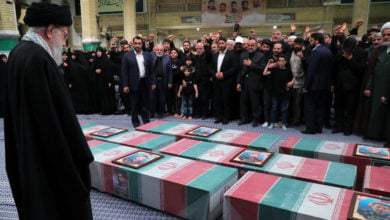In response to more than a year of nationwide struggle by the courageous Yemeni people, the U.S.-backed president, Ali Abdullah Saleh, has finally been forced to relinquish power.
Saleh agreed to step down, however, only under the specific conditions negotiated by the Gulf Cooperation Council, a consortium of regional U.S. client states, including Saudi Arabia, Bahrain, Qatar, the United Arab Emirates, Oman and Kuwait.
Under the terms of the GCC deal, power was transferred to none other than Saleh’s former vice president, Abd Rabbu Mansour Hadi. Saleh will furthermore be granted immunity from criminal prosecution, a component of the agreement vehemently opposed by the Yemeni people, who want no more than to see justice served after the brutal repression of their movement for democracy.
The official transfer of power took place on Feb. 25, five days after so-called elections occurred—“elections” in which Hadi was the sole candidate.
In a country of more than 24 million people, just over 6.5 million people (65 percent of the eligible electorate) participated in the election. According to Yemen’s Supreme Commission for Elections and Referendum, 99.6 percent of votes went to Hadi. (The New York Times, Feb. 24)Hadi is set to serve a two-year term as president while overseeing the drafting of a new constitution. Parliamentary elections are scheduled to take place in 2014.
Despite Saleh’s forcible ouster and replacement, the move is broadly viewed as no more than a superficial change of face.
Fierce anti-government resistance continues
“The Yemeni people staged demonstrations for an entire year. They didn’t do this just for Saleh to leave, but for his whole regime,” said parliament member Ali al-Mamari, “and that especially means those who are leaders in the armed forces.” (The New York Times, Feb. 26)
Vast numbers of Yemeni youths—the central leaders of the year-long mass uprising—“have denounced the vote as a sham that keeps much of the former president’s regime intact.” (Washington Post, Feb. 25)
Many in the ongoing separatist movement that dominates the south called on Yemenis to refuse to participate in the election. Northern-based Shia rebels also called for a boycott.
Nearly 16,000 people voted against Hadi, instead writing “no” on their ballots, according to Yemen Times editor-in-chief Nadia al-Sakkaf. Many voters were so opposed to Hadi that, rather than voting for him, they wrote in “the revolution continues,” resulting in the invalidation of nearly 9,000 ballots. (The New York Times, Feb. 24)
Even as the election was taking place, renewed violence erupted, claiming the lives of nine people, including one child. Simultaneous with Hadi’s swearing-in ceremony, a car bomb was detonated, killing 26 more people in the southeastern province of Hadramawt. Just hours later, government targets were attacked in the southeastern port of Mukalla, killing at least 21 soldiers. (The New York Times, Feb. 25) Most recently, on March 4, as many as 190 Yemeni soldiers were killed in clashes with anti-government forces in the southern city of Dofus. (Yemen Times, March 8)
Furthermore, despite his replacement, Saleh still holds considerable influence in Yemen’s major centers of power. Many of his family members still control military and government security agencies, including his son Ahmed Ali Saleh, who commands the Republican Guard, and his nephew Yahya Saleh, who heads Yemen’s central security services. Hadi has not taken “over the military and security services, including counterterrorism units,” said Yemeni analyst and editor-in-chief of al-Ahali Newspaper Ali Al-Jaradi. “They are still [in] the hands of relatives [of] the ousted President Ali Abdullah Saleh.” (Yemen Post, March 7)
Yemen remains a U.S. client state
Past actions, as well as forthcoming U.S. plans for Yemen, make it abundantly clear that the United States still dominates the country’s most powerful institutions.
Since last spring, CIA and Special Operations forces carried out nearly a dozen drone strikes in Yemen, which no doubt required full government approval. (The New York Times, Feb. 26) Three U.S. citizens residing in the country were killed in separate drone strikes last fall, including Samir Khan, Anwar al-Awlaki and his 16-year-old son Abdulrahman al-Awlaki. Al-Awlaki’s 17-year-old nephew also died in the attack that killed his son. (Washington Post, Oct. 17, 2011
Now the United States plans to significantly increase military aid. So far this year, $53.8 million in so-called “security assistance” has already been allocated, up from $30.1 million last year, according to the State Department. (The New York Times, Feb. 26)
The Obama administration also plans to implement significant changes in Yemen’s military structure and strategy. In a trip to Yemen’s capital city of Sana’a late last month, John O. Brennan, President Obama’s chief counterterrorism adviser, laid out new plans similar to those taken in Iraq and Afghanistan.
“Special Operations troops, Central Intelligence Agency paramilitary teams and drones” will continue to be employed, in addition to “arming and advising indigenous security forces.” Supplies to be shipped to Yemen will include “trucks, troop carriers, transport helicopters, ammunition, spare parts and other logistical support.” (The New York Times, Feb. 26)
As the first of a series of recurring meetings approaches, a high-ranking Yemeni military delegation is scheduled to arrive in Washington sometime this month. The United States will also continue to work with its many client states in the region, most notably Saudi Arabia, to train and supply Yemen’s security agencies.
While it is a profound and truly historic achievement that the people of Yemen were able to singlehandedly force a U.S.-backed strongman from power, we cannot allow ourselves to be lulled into passivity. Now more than ever, we need to stand against imperialist intervention in Yemen and oppose military aid to the Yemeni government. Defend the self-determination of the Yemeni people!






